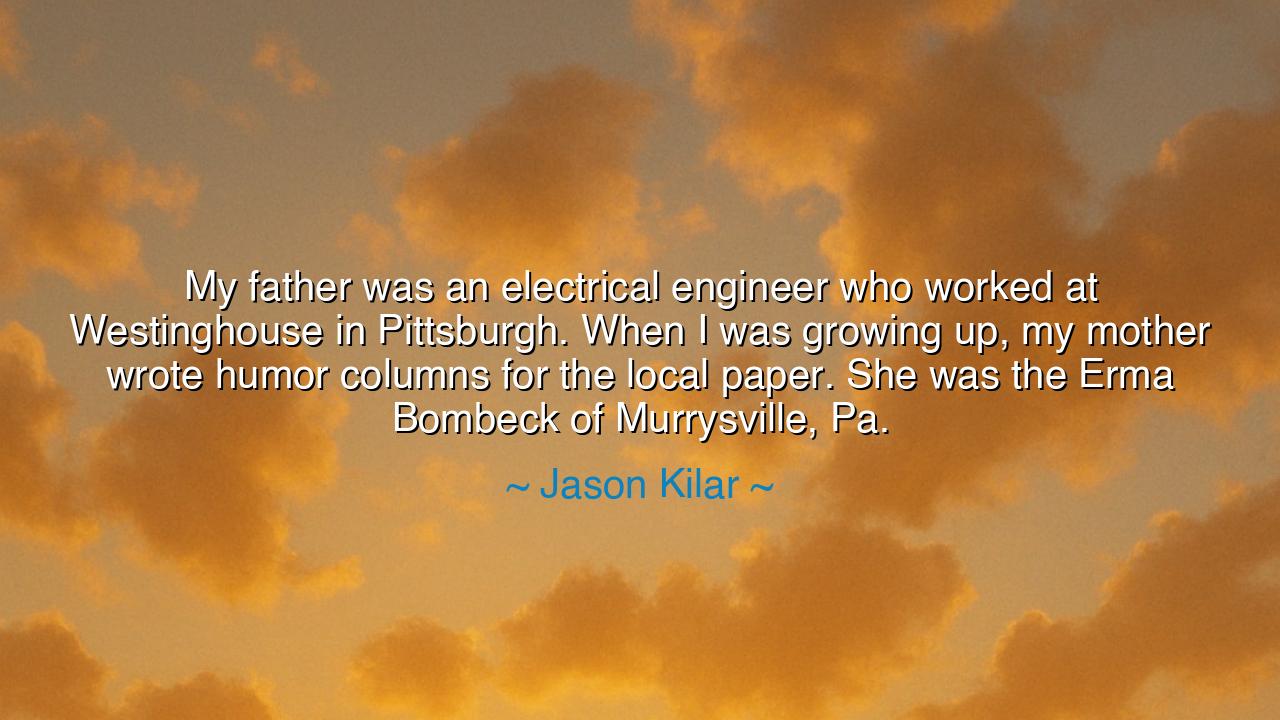
My father was an electrical engineer who worked at Westinghouse
My father was an electrical engineer who worked at Westinghouse in Pittsburgh. When I was growing up, my mother wrote humor columns for the local paper. She was the Erma Bombeck of Murrysville, Pa.






In the mosaic of life, where each generation carries forward the wisdom of those who came before, there exists a story that weaves the practical with the imaginative, the technical with the creative. Jason Kilar, in his reflection on his upbringing, speaks of his parents—his father, a man of science and precision, an electrical engineer at Westinghouse in Pittsburgh, and his mother, a woman of wit and insight, who wrote humor columns for the local paper. "She was the Erma Bombeck of Murrysville, Pa.," he says, invoking a name that would become synonymous with everyday humor. This statement speaks not only to the lineage of Kilar’s upbringing but to the delicate balance that life itself demands—the union of intellect and creativity, logic and laughter, both of which shaped his world.
From the beginning of time, the greatest civilizations have understood the importance of such balances. Consider the ancient Greeks, who revered the philosophers and the artisans, the thinkers and the doers. They believed that a person’s soul should not lean too far in any one direction, for wisdom is found when reason and creativity exist side by side. Socrates, the great thinker, emphasized the importance of dialogue and reflection, but he was not alone. The writers and poets like Aristophanes, known for his humor and sharp wit, reminded the people that humor is not only a respite from life’s burdens but also a profound way of seeing the truth. Jason Kilar’s upbringing, then, was shaped not just by his father’s engineering mind, but by his mother’s ability to see the humor in the everyday, to find lightness in the mundane.
In ancient Rome, too, there was a balance between the logical and the lively. Cicero, the statesman and philosopher, was admired for his speeches, filled with both rhetoric and moments of ironic humor that made complex arguments accessible. Even in the serious world of politics and governance, Cicero understood that humor could disarm his opponents and engage his listeners. In the same way, Kilar’s mother, as the "Erma Bombeck" of her small town, understood that humor could connect people, create community, and elevate the ordinary into something special. Through her writing, she transformed the mundane struggles of daily life into relatable, joyful moments for others.
This duality of pragmatism and creativity is often passed down through generations, as it was in Kilar’s family. His father, a man who worked with precision at Westinghouse, represents the rational mind, one focused on understanding the natural world through science and engineering. His work was about the laws of nature, the invisible forces that govern our lives. In contrast, his mother’s humor columns captured the essence of life’s daily trials through the lens of laughter. She observed the world with a sharp eye, finding in its chaos and imperfections a lightness that could transform the human experience. This combination of the scientific and the humorous—the mind and the heart—shapes the essence of Kilar’s upbringing.
Just as the ancients revered the balance of opposites, so too does Kilar’s story teach us that both the intellectual and the creative spirit are necessary for a fulfilled life. Erma Bombeck, the humorist to whom Kilar refers, understood that humor has the power to heal and to enlighten. Bombeck’s work was not simply about making people laugh; it was about making people see the humor in the human condition, to bring relief to those who faced the trials of parenthood and everyday struggles. Like her, Kilar’s mother used humor as a way of empowering others, showing that even the most difficult moments could be faced with a smile, a wink, and a deep understanding of what it means to be human.
Thus, we learn from Kilar’s reflection that we, too, must embrace both the logical and the creative within ourselves. Life is not just about accomplishing tasks or solving problems, as his father might have done through engineering, nor is it only about seeking moments of laughter to escape life’s challenges. Rather, true wisdom comes when we can marry both elements: the practicality of understanding the world with the creativity to find joy in it, and the ability to see humor in the everyday while embracing life’s deeper truths.
So let us follow the wisdom of both Kilar’s parents: Let us build with precision and logic, as Kilar’s father did, and let us live with creativity and humor, as his mother did. Whether we are engineers, artists, or everyday people, we must learn to see the balance between mind and heart, reason and imagination, seriousness and joy. In doing so, we will create lives that are not just efficient and productive, but rich in meaning and connection, filled with laughter even in the most challenging of moments. This is the lesson passed down through the ages: to create, to live, and to laugh.






AAdministratorAdministrator
Welcome, honored guests. Please leave a comment, we will respond soon